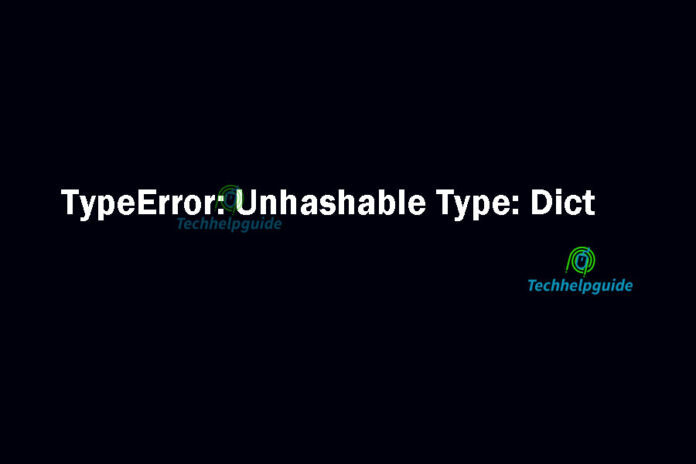Python is a versatile and powerful programming language widely used in various domains, including web development, data analysis, and artificial intelligence. Like any programming language, Python is prone to errors, which can hinder the execution of your code. One common error that Python developers encounter is the “TypeError: Unhashable type: dict.” In this article, we will delve into the details of this error, explore its causes, and provide practical solutions to resolve it.
Understanding the TypeError: Unhashable Type: Dict
The “TypeError: Unhashable type: dict” occurs when you attempt to use a dictionary as a key within another dictionary or as an element of a set. In Python, certain data types, such as integers, floats, and strings, are considered hashable, meaning they can be used as keys in dictionaries or elements in sets. However, dictionaries themselves are mutable and, therefore, unhashable. This distinction causes the error when you try to use a dictionary in a context that requires hashable types.
Causes of the TypeError: Unhashable Type: Dict
The TypeError typically occurs due to a misunderstanding of how hashable types work in Python. It can arise from various scenarios, including:
a) Nesting Dictionaries:
Attempting to use a dictionary as a key within another dictionary or as an element in a set.
b) Modifying Dictionary Keys:
Changing the value of a dictionary key after it has been used as a key in another dictionary or set. c) Using Dictionaries in Sets: Adding a dictionary as an element to a set, which requires hashable types.
Working with Hashable Types in Python
In Python, hashable types are those that can be uniquely identified by their value and have a hash value that remains constant throughout their lifetime. Immutable data types, such as integers, floats, strings, and tuples, are hashable. On the other hand, mutable data types, like dictionaries and lists, are unhashable.
To use a type as a dictionary key or set element, it must be hashable. Python’s hash function generates a unique hash value based on the object’s content, allowing efficient lookup and retrieval. Since dictionaries rely on hash tables for fast key-value access, using unhashable types like dictionaries as keys are prohibited.
Common Scenarios Triggering the TypeError
The TypeError: Unhashable Type: Dict can occur in various situations. Let’s explore some common scenarios where this error might be encountered:
a) Dictionary as a Key: When attempting to use a dictionary as a key in another dictionary, the TypeError is raised. For example:
my_dict = {{'name': 'John'}: 42} # Raises TypeError: Unhashable type: 'dict'
b) Dictionary in a Set: Similarly, when trying to add a dictionary as an element in a set, the TypeError is raised. For instance:
my_set = {{'a', 'b', 'c'}, {'d', 'e', 'f'}, {'name': 'John'}} # Raises TypeError: Unhashable type: 'dict'
c) Modifying Dictionary Keys: If you modify a dictionary key after it has been used as a key in another dictionary or set, the TypeError may occur. Here’s an example:
my_dict = {'name': 'John'}
my_set = {my_dict} # No error
my_dict['name'] = 'Jane' # Modifying the dictionary key
my_set.remove(my_dict) # Raises TypeError: Unhashable type: 'dict'
Analyzing the Error Message
When encountering the TypeError: Unhashable Type: Dict, it is essential to understand the error message Python provides. Let’s break down the error message into its components:
TypeError: Unhashable type: 'dict'
- TypeError: Indicates the type of error encountered.
- Unhashable Type: Specifies that the type being used (in this case, ‘dict’) is unhashable.
By analyzing the error message, you can identify the type causing the issue and focus on finding a suitable solution.
Resolving the TypeError: Unhashable Type: Dict
Fortunately, there are several ways to resolve the TypeError: Unhashable Type: Dict error in Python. Here are some effective solutions:
Solution 1: Convert Dictionaries to Immutable Types
One approach is to convert the dictionaries to immutable types, such as tuples or frozen sets, which are hashable. This conversion allows dictionaries to be used as keys in other dictionaries or elements in sets. Here’s an example:
my_dict = {'name': 'John', 'age': 30}
my_key = tuple(my_dict.items()) # Convert dictionary to tuple
other_dict = {my_key: 'value'} # No error
In this example, the items() method retrieves the key-value pairs of the dictionary, which are then converted to a tuple using the tuple() function. The resulting tuple, my_key, can be used as a key in the other_dict dictionary.
Solution 2: Use Tuples Instead of Dictionaries
Another solution is to rethink the data structure and use tuples instead of dictionaries when appropriate. Unlike dictionaries, tuples are immutable and hashable, making them suitable for scenarios that require hashable types. Consider the following example:
person1 = ('John', 30)
person2 = ('Jane', 28)
people_set = {person1, person2} # No error
Here, each person’s information is stored as a tuple, which can be safely added to the people_set set without raising the TypeError.
Solution 3: Implement a Custom Hashing Method
If you need to use dictionaries in a specific context, you can implement a custom hashing method for your dictionary objects. By overriding the __hash__() method, you can define a custom hash value for your dictionaries. Here’s an example:
class CustomDict:
def __init__(self, data):
self.data = data
def __hash__(self):
return hash(frozenset(self.data.items())) # Hash based on key-value pairs
my_dict = CustomDict({'name': 'John', 'age': 30})
my_set = {my_dict} # No error
In this example, we create a custom dictionary class, CustomDict, and define the __hash__() method to generate a hash value based on the key-value pairs using a frozenset. The resulting hash value allows instances of CustomDict to be used as elements in sets.
Solution 4: Use a Different Data Structure
If the use of dictionaries as keys or set elements is not essential for your specific scenario, consider using alternative data structures. Depending on your requirements, lists, namedtuples, or even custom objects may serve as suitable replacements for dictionaries. Analyze your code and determine if a different data structure can fulfill your needs without encountering the TypeError.
Best Practices to Avoid the TypeError
To prevent encountering the TypeError: Unhashable Type: Dict in your Python code, consider the following best practices:
a) Understand Hashable Types:
Familiarize yourself with the concept of hashable types in Python. Understand which data types are hashable (e.g., strings, integers, tuples) and which are not (e.g., dictionaries, lists).
b) Choose the Right Data Structure:
Select the appropriate data structure based on your needs. If you require hashable types for keys or set elements, avoid using dictionaries or mutable types.
c) Convert Data when Necessary:
Convert mutable types to immutable types when using them as keys or set elements. Utilize functions like tuple() or frozenset() to convert dictionaries to tuples or frozensets, respectively.
d) Keep Keys Immutable:
Avoid modifying dictionary keys once they have been used in other dictionaries or sets. Modifying a key can invalidate its hash value and lead to the TypeError.
e) Test and Debug:
Regularly test your code and identify potential errors early on. Thoroughly debug your code to catch any instances of the TypeError: Unhashable Type: Dict.
FAQ: Frequently Asked Questions
What does “TypeError: Unhashable type: dict” mean?
The “TypeError: Unhashable type: dict” error indicates that you are attempting to use a dictionary as a key within another dictionary or as an element in a set, which is not allowed due to dictionaries being unhashable in Python.
Why does this error occur in Python?
This error occurs because dictionaries are mutable and unhashable, meaning they cannot be used as keys in other dictionaries or as elements in sets, which require hashable types.
How can I fix the TypeError: Unhashable Type: Dict?
There are several ways to resolve this error, including converting dictionaries to immutable types like tuples, using alternative data structures, or implementing a custom hashing method for dictionaries.
Can I make dictionaries hashable in Python?
No, dictionaries are inherently mutable and, therefore, unhashable. You cannot make dictionaries hashable directly. Instead, you can convert dictionaries to hashable types or use alternative data structures.
Are there any alternative data structures to dictionaries?
Yes, depending on your specific requirements, you can consider using alternative data structures such as lists, namedtuples, or custom objects as replacements for dictionaries.
How can I prevent the TypeError in my code?
To prevent the TypeError: Unhashable Type: Dict, ensure you understand hashable types, choose appropriate data structures, convert data when necessary, keep keys immutable, and regularly test and debug your code.
Conclusion
The “TypeError: Unhashable type: dict” error in Python can be frustrating, but with a clear understanding of hashable types and appropriate solutions, you can overcome it. By converting dictionaries to immutable types, using alternative data structures, implementing custom hashing methods, and following best practices, you can prevent this error and write more robust Python code.
Read Also:
Fixed: Error Code 0xc000000f
import matplotlib.pyplot as plt error
ImportError: Cannot Import Name force_text from django.utils.encoding











